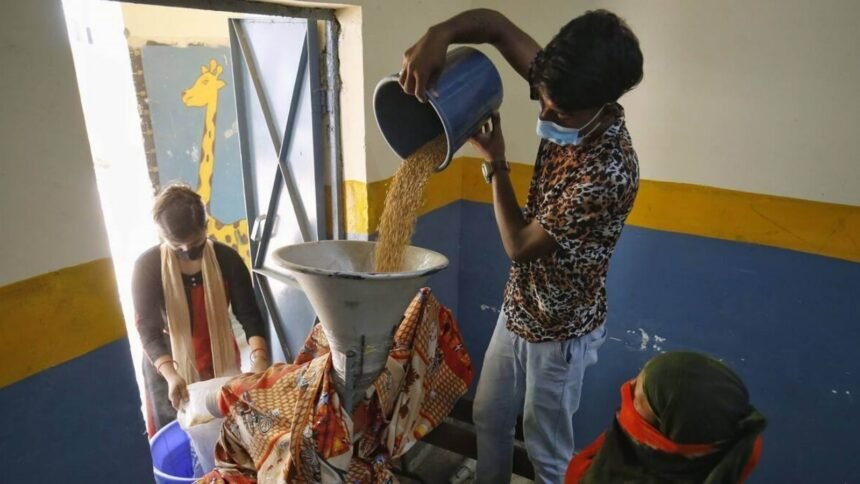THE CENTRAL government has for the first time prepared a list of ration card holders who may not qualify for benefits such as free food grains since they are either taxpayers, owners of four-wheelers or even directors in companies.
The Centre’s Department of Food and Public Distribution has arrived at such a list by matching the details of ration card holders with databases of government entities such as the Income-Tax department (taxpayers), Ministry of Corporate Affairs (directors) and Ministry of Road Transport & Highways (four-wheeler owners).
In this exercise of cross-verification, the department found that 94.71 lakh ration card holders are taxpayers, 17.51 lakh are owners of four-wheelers and another 5.31 lakh ration card holders are directors in companies.
The officials said these ration card holders — about 1.17 crore — may not qualify for free food grains under the National Food Security Act (NFSA). Having arrived at this list, it has now directed states to undertake necessary field verification and remove the ineligible ration card holders by September 30.
Responding to a query from The Indian Express, an official from the Department of Food and Public Distribution said the Centre “has helped states by providing this data to identify and remove ineligible beneficiaries so that genuine people in the waiting list can avail the scheme”. The review of ration cards/ beneficiaries list, identification of ineligible/ duplicate ration cards and inclusion of eligible beneficiaries/ households is the responsibility of states, he said.
The NFSA dashboard shows that 19.17 crore ration cards have been issued as on August 19, with total beneficiaries across 36 states and Union Territories totalling 76.10 crore. As per rules, all government employees, households with annual income of Rs 1 lakh or more, four-wheeler owners, and taxpayers are ineligible to get free foodgrains.
In a letter to Chief Secretaries of all states and Advisors to the UT Administrators, Union Food Secretary Sanjeev Chopra reiterated the government’s earlier instructions about discrepancies identified in the Ration Card Management System (RCMS) database.
Story continues below this ad
“These discrepancies were related to beneficiaries who were either duplicate, deceased, or inactive (silent beneficiaires) and State/UTs were accordingly advised to undertake identification and field verification of such beneficiaries,” he wrote in the letter sent to states on July 8, 2025.
“In continuation of this initiative, the Department has undertaken a comprehensive exercise to further strengthen rightful targeting by matching RCMS data with databases of various Government of India entities including the Central Board of Direct Taxes (CBDT), Central Board of Indirect Taxes and Customs (CBIC), Ministry of Corporate Affairs (MCA), Ministry of Road Transport & Highways (MoRTH), and PM-Kisan,” Chopra wrote.
“Based on this inter-ministerial data convergence, the Department has identified a set of beneficiaries who appear in one or more of the above databases and may not qualify as per eligibility norms prescribed by respective States/UTs. These lists will be shared with all States/UTs via API-based integration and will be visible to State officials through the Rightful Targeting Dashboard developed by the Department,” he wrote.
“As you are aware, the responsibility for identification of beneficiaries rests with the State Government. You are, therefore, requested to kindly undertake necessary field verification of such flagged cases and initiate appropriate action for data cleansing, wherever ineligibility is established. This exercise is critical to ensure that the resources under TPDS are directed only towards the eligible households,” said Food Secretary Chopra.
Story continues below this ad
“I am sure that you will appreciate that cleansing the database of ineligible beneficiaries will enable any left-out deserving individuals and families to be included in the system, thus reinforcing the equity and integrity of the Public Distribution System,” he said.
“It is requested that the above exercise be completed expeditiously and latest by 30th September 2025,” Chopra said in the report.
In July, the Centre had informed Rajya Sabha that as many as 1.34 crore “bogus/ ineligible” ration cards had been deleted/ cancelled during 2021-2023.
The NFSA, introduced by the then UPA government with effect from July 5, 2013, entitles 67 per cent of households—50 per cent urban and 75 per cent rural— to receive food grains at a subsidised price (rice Rs 3/kg, wheat Rs 2/kg) under the Targeted Public Distribution System (TPDS). In absolute terms, the maximum number of people, which can be covered by the NFSA across the country is about 81.35 crore. However, the NDA government has waived the subsidised prices under its Pradhan Mantri Garib Kalyan Anna Yojana, providing free food grains.








